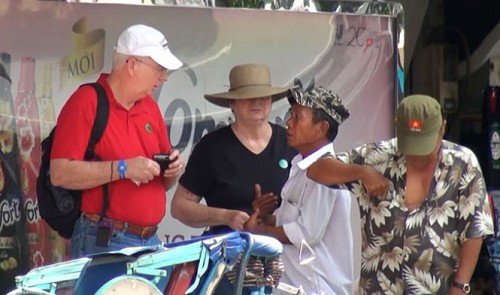Ten thousand dong is not a lot of money to some people, or an outrageous sum to others. To convert into U.S. currency, it’s about 10 cents. It took me months to get my head around this bizarre idea. Confused? Join the club!
A recent Facebook post has chronicled the Machiavellian scheme of one expat in Da Nang who sought revenge for being overcharged 4,000 dong for a 6,000 dong sugarcane juice, or nuoc mia. I had to read it four times to make sure it wasn’t a joke, but the expat apparently ‘had a bone to pick’ with the shopkeeper (there was something he wanted to talk about) and had his Vietnamese wife buy the juice again, at the regular price. Lurking anonymously while she made the purchase, he confronted the shopkeeper afterwards, but the shopkeeper remained unrepentant.
It’s called quibbling in English, arguing about something so trivial that it only becomes important because one person in the argument believes it so.
I used the example above in my class that night to express the English idiom, ‘Storm in a tea up’ - a problem that is so small that it has virtually no impact, outside of the argument itself. Another great idiom that sprang out of this lesson was ‘The lights are on but nobody’s home’ (I’m sure you understand that one!) and then finally, ‘A pain in the neck’; someone who causes a lot of unnecessary trouble.
The notion that we should all be charged fairly and equally exists in most Western countries, although anyone who has travelled understands the concepts of ‘buyer beware’ and ‘charge as much as the market will bear’. Most people would argue that this particular shopkeeper doesn’t make a lot of money, and the price difference is very silly. Secondly, why didn’t the buyer just go to another shop if the juice was that important to him? And finally, getting that upset over such a small sum might indicate some underlying anger issues.
But he’s not alone in his opinion. Even 1,000 dong is outrageous when you look at it from a local perspective. For example, I often buy small bottles of water during school from the lady down the road. She charges me 5,000 dong per bottle. My students were horrified by this knowledge, and told me that I should have buy in bulk, a large box of water from another shop, equaling about 3,000 dong per bottle. For locals, 7,000 to 10,000 dong buys breakfast depending on quality, quantity and how fancy the food is – street stalls or eat-in cafés. 10,000 to 20,000 can buy you a huge lunch or dinner on the street.
People in poor countries are brought up with the idea that spending is a sin. When shopping, they are always challenged to find a cheaper alternative, or get the best deal they possibly can. So it’s strange that we foreigners can lavish huge sums of money on the simplest things without even thinking about it – no wonder some locals want to charge us more! We’re crazy with our money!
Five years ago I recall having to pay the difference to a local xe omafter a backpacker complained about the 50,000 price tag for a 3 kilometer ride from Hoi An to the beach nearby. A local would get the same ride for around 10,000 dong, but the metered taxis are slightly more expensive. However, the real problem wasn’t the price, it was the attitude of the traveler, abusing the 50 something year-old man who does this job because he can’t get something better – plus he’s got a family to support...
I paid up because I know what things cost to a local, and am aware of their daily struggle to make a living. While we see many in Vietnam now with new cars and great houses – a lot of that is just debt to the bank, and still represents only a tiny proportion of people here, especially when you think about the vast rural population, who have yet to reach the middle class. My neighbors are an example of those who get up well before dawn and often work late, just to make salaries that would turn a Westerner pale.
So don’t quibble, folks – be generous and enjoy the local juice... you never know, you might just make someone’s day, even if it cost you 10 cents more!
























































